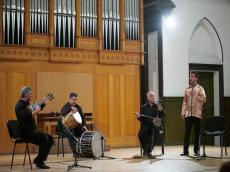|
|
TODAY.AZ / Arts & Entertainment
Unique music performance surprises music lovers
08 June 2018 [17:25] - TODAY.AZ

By Azernews
By Laman Ismayilova
Goethe-Zentrum Baku has announced its summer program with the launch of international festival of electronic and experimental music.
A music performance titled "?övq v? H?sr?t" was presented on June 2 as part of the festival, Day.Az
Addressing the event, Goethe-Zentrum Baku director Alfons Hug delivered detailed information about the summer program in Organ and Chamber Music Hall (Kirche).
Then the floor was given to the Secretary-General of the Goethe Institute, Johannes Ebert, who arrived in Baku on an official visit.
Mr. Johannes Ebert expressed his gratitude to Goethe-Zentrum Baku team and said that holding of cultural events promotes an even closer rapprochement between the two countries.
German ambassador to Azerbaijan Michael Kindsgrab, as well as the First Deputy Minister of Culture of Azerbaijan Vagif Aliyev also stressed the importance of the events held by Goethe-Zentrum Baku.
The head of the State Historical and Architectural Reserve "Icherisheher" Asgar Alakbarov also addressed the event.
Further, Elchin Shirinov (jazz pianist), talented singers Sarhan Bunyadzade and Zabit Aliyeva, Elshan Munsurov (kemancha), Elchin Nagiyev (tar), and Husameddin Azizov (naghara) presented the project of musicologist Jahangir Selimkhanov "?övq v? H?sr?t".
"?övq v? H?sr?t" is a music performance in which traditional mugham is juxtaposed to contemporary jazz. The project had been specially designed for the Azerbaijan Cultural Year in Germany and performed to critical acclaim at the famous Akademie der schönen Künste (Academy of Fine Arts) in Munich on June 25, 2008, and has never been performed since then.
Sehnsucht (longing) is the eternal motive of the traditional mystical Eastern poetry alluding to the Sufi concept of unearthly love, which in principle does not imply a possibility of union with the transcendent, the Beloved. Two mugham singers - a young man and a woman are the main protagonists of the musical story. The jazz pianist plays all the time strictly in the pauses between the mugham pieces never trying to make an eclectic mixture with mugham.
The musical performance was greeted with a storm of applause.
Goethe-Zentrum Baku is a part of Goethe-Institut, the Federal Republic of Germany’s cultural institute, active worldwide. Goethe-Institut promotes the study of the German language abroad and encourages international cultural exchange. It is not only committed to the promotion of German culture but also of international artistic cooperation.
Goethe-Zentrum Baku builds bridges between Azerbaijan and Germany through cultural diplomacy by organizing exhibitions, presentations, artists talks, lectures, literature readings, concerts, film screenings and many other activities at Kapellhaus, a home to German-Azerbaijan Cultural Association, and in partnership with various local institutions such as the Ministry of Culture, Icherisheher administration and Yarat.
Its summer programme includes the launch of Unsound Dislocation Festival, the Dialogue project curated by Asli Samadova, the Art & Football exhibition curated by Goethe-Zentrum Baku director Alfons Hug and a series of music events that are scheduled throughout June and July.
The Dialogue project pairs site-specific artworks in the buildings originally built for religious purposes: Egyptian artist Youssef Limoud’s Maqam. Poetry of Ruins installation at Neo-Gothic Kapellhaus is coupled with German artist Mischa Kuball’s Five Suns/after Galileo at the 15th century Shah Mosque of Shirvanshahs Palace.
The Goethe-Zentrum Baku policy is to keep up high standards of cultural programming and make all its events free of charge and, thus, accessible to everyone.
/t_musicff1.jpg)
/t_musicff10.jpg)
/t_musicff11.jpg)
/t_musicff12.jpg)
/t_musicff13.jpg)
/t_musicff14.jpg)
/t_musicff15.jpg)
/t_musicff16.jpg)
/t_musicff18.jpg)
/t_musicff19.jpg)
/t_musicff2.jpg)
/t_musicff20.jpg)
/t_musicff21.jpg)
/t_musicff22.jpg)
/t_musicff23.jpg)
/t_musicff3.jpg)
/t_musicff4.jpg)
/t_musicff5.jpg)
/t_musicff6.jpg)
/t_musicff7.jpg)
/t_musicff8.jpg)
/t_musicff9.jpg)
URL: http://www.today.az/news/entertainment/170873.html
 Print version
Print version
Connect with us. Get latest news and updates.
See Also
- 18 December 2025 [14:53]
Culture Ministry listed among winners of MilliNet 2025 competition - 18 December 2025 [13:33]
Opera 'Nasimi' to be presented in new AI-Powered stage production - 18 December 2025 [12:56]
Live-Show: Czechia through eyes of Azerbaijani artists - 17 December 2025 [13:11]
Culture Ministry, UNAOC explore new opportunities for cooperation - 17 December 2025 [11:56]
Master classes on tar and piano held in Mingachevir - 16 December 2025 [12:48]
Anthology 'Classic Czech Short Stories' in Azerbaijani presented in Prague - 16 December 2025 [12:27]
Azerbaijani tenor shines at London’s Royal Opera House - 16 December 2025 [12:17]
Azerbaijan represented at int'l exhibition in Algeria - 16 December 2025 [11:41]
Culture Minister participates in UNAOC Group of Friends High-Level Meeting - 16 December 2025 [10:42]
Navruz ensemble shines at Uzbekistan Culture Days
Most Popular
 Hornet's nest has been stirred up: how topic of Western Azerbaijan scared revanchists
Hornet's nest has been stirred up: how topic of Western Azerbaijan scared revanchists
 Huawei debuts new smartphones and devices in Argentina
Huawei debuts new smartphones and devices in Argentina
 Azerbaijan, Turkiye sign pact to strengthen military security
Azerbaijan, Turkiye sign pact to strengthen military security
 Russia open to consultations on TRIPP initiative with Armenia
Russia open to consultations on TRIPP initiative with Armenia
 Why Iran fears Corridor that Armenia sees as lifeline
Why Iran fears Corridor that Armenia sees as lifeline
 PM Asadov mulls regional co-op and North-South corridor with Astrakhan governor
PM Asadov mulls regional co-op and North-South corridor with Astrakhan governor
 President Ilham Aliyev addresses participants of 8th Congress of Azerbaijan Trade Unions Confederation
President Ilham Aliyev addresses participants of 8th Congress of Azerbaijan Trade Unions Confederation
